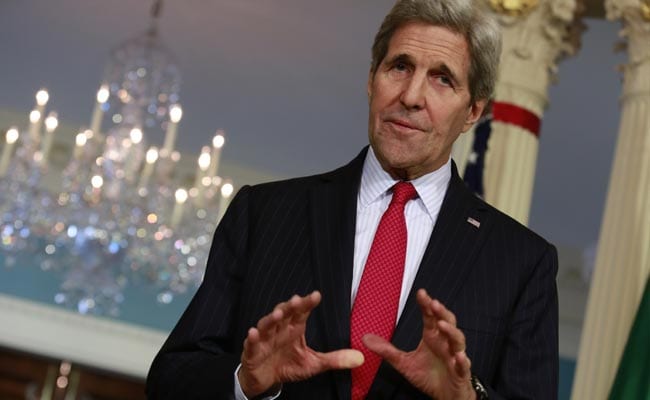
US Secretary of State John Kerry traveled to Moscow to assure Syrian President Bashar al-Assad’s key ally that Washington is not seeking ‘regime change’ in Syria. (AFP)
US Secretary of State John Kerry traveled to Moscow this week to assure Syrian President Bashar al-Assad’s key ally that Washington is not seeking “regime change” in Syria.
And on Thursday, the top US diplomat met Saudi Foreign Minister Adel al-Jubeir to reassure Assad’s most implacable foe that the United States is not going soft on the Syrian strongman.
Kerry’s high-stakes diplomatic balancing act aims to keep both Moscow and Riyadh on board as the 17-nation International Syrian Support Group (ISSG) struggles to cobble together peace talks.
On the eve of the UN talks, Assad warned in an interview with Dutch television that misguided efforts to bring about regime change would make the conflict “drag on” and that only backers Russia and Iran — not the West — were ready to resolve his country’s nearly five-year conflict.
Washington and UN Syrian envoy Staffan de Mistura want Assad’s regime and the armed groups ranged against him to send delegates to peace talks some time on or after January 1.
If a ceasefire can be reached in Syria’s four-and-a-half-year-old civil war, then Syrian troops, Russia and a US-led coalition can focus their fire on the hardline terrorist ISIS.
Under a deal struck last month in Vienna, government and rebel negotiators would have six months to form a transitional government and 18 months to organize national elections.
‘Terrorists’ denounced
But several questions still hang over the process.
Will Assad and his foreign backers Russia and Iran agree to sit down with rebel groups they routinely denounce as “terrorists”?
And, will the rebels and their foreign backers countenance talks with a regime that has slaughtered thousands of its own citizens with barrel bombs and poison gas?
Today, international envoys — including in particular Russia’s Foreign Minister Sergei Lavrov — want to hear from Saudi Arabia how its efforts to mediate a rebel coalition are progressing.
US State Department spokesman John Kirby said Jordan would give an update on its role in the process — drawing up a list of which “terrorist” groups should be blacklisted from talks.
Even if a ceasefire is possible, who would monitor it? And who would lead the fight against the ISIS group and others, such as Al-Qaeda’s Al-Nusra Front, left outside the peace process?
To address these and other questions, the International Syrian Support Group will meet at US invitation today morning at a New York hotel to try to narrow their disagreements.
Diplomats will then travel the short distance to the United Nations to seek, and likely obtain, approval of the UN Security Council for the process.
“So the big result for the afternoon session is obviously this resolution, and the secretary remains confident that we can get there,” Kirby said Thursday.
US diplomats concede that the plan is ambitious and that success is not certain, but they hope that Russia and Saudi Arabia will cajole their rival Syrian allies to the table.
President Vladimir Putin, they reason, will not want to see the Russian forces he sent to Syria to shore up Assad’s beleaguered regime bogged down in an indefinite conflict.
Meanwhile, the threat of ISIS attacks and waves of Syrian war refugees spilling out from Syria into the Middle East and Europe has concentrated minds in other foreign capitals.
Shunned Russia
But the United States appears to have already made its own compromises in the search for peace.
Where once it shunned Russia and imposed sanctions on its economy to punish Putin for his aggression against Ukraine, now Kerry publicly thanks Moscow for its “constructive” role in Syria.
And — while the State Department insists there is no change in its policy that Assad has lost all legitimacy to lead Syria — Washington has noticeably toned down calls for him to step down.
“We emphasized today that the United States and its partners are not seeking regime change, as it is known, in Syria,” Kerry said Tuesday at the Kremlin after talks with Putin.
“What we have said is that we don’t believe that Assad himself has the ability to lead the future Syria,” he said.
It was only after Tuesday’s talks with Kerry that Russia — which had previously been cautious about convening another meeting of the Syrian Support Group — agreed to take part.
Assad, in his interview with Dutch television, turned sarcastic when asked whether he was comforted that the West’s stances on his departure were seemingly softening.
“I was packing my luggage, I had to leave, but now I can stay,” he said sardonically.
More than 250,000 people have died since Syria’s conflict erupted in March 2011, and millions more have fled their homes.











